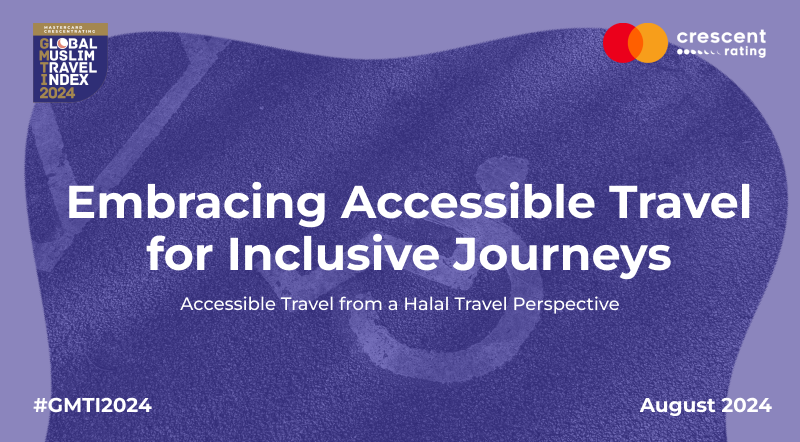
In a world where travel has become an integral part of life, ensuring that everyone, regardless of their physical capabilities, can participate fully and enjoy the experiences is paramount. This year’s Global Muslim Travel Index (GMTI) 2024, released by Mastercard-CrescentRating, underscores the importance of accessible travel as a cornerstone of responsible tourism. As global movements towards inclusivity and equality gain momentum, removing barriers that prevent individuals from accessing and enjoying tourism services has become an urgent priority.
Accessible travel is not merely about physical modifications to infrastructure but encompasses a holistic approach that respects and upholds the dignity of all travelers. This approach aligns with the objectives of the Islamic faith, emphasizing the preservation of dignity and life. Multi-generational family groups are common among Muslim travelers, which highlights the necessity of accessibility in travel services. These services must cater not only to physical accessibility but also to cultural and spiritual needs, creating environments where all individuals are treated with respect.
The GMTI 2024 introduces the Accessible Travel Framework (ATF), a comprehensive guideline designed to develop accessible services in the travel industry. The ATF recognizes the diverse needs of travelers, including those with disabilities and specific cultural and faith requirements. It is based on principles of inclusivity, cultural sensitivity, and universal design, ensuring that all aspects of travel are inclusive and accessible.
For destinations aiming to attract Muslim travelers, ensuring accessibility to mosques and ablution facilities is crucial. As the number of Muslim travelers, including women, elderly individuals, and those with physical disabilities, continues to grow, providing inclusive and accessible facilities becomes essential.
Several destinations have set benchmarks in accessible travel, demonstrating best practices that can serve as models for others.
Australia’s commitment to accessible tourism is evident in its inclusive policies and legislation, such as the Disability Discrimination Act 1992. The country offers a wealth of resources to support accessible tourism, including online accessibility assessments and guides. Australia provides various accessible transportation options, accessible accommodation, and a wide range of inclusive experiences, from wheelchair-accessible trails to sensory-friendly attractions.
Dubai exemplifies best practices in accessible tourism by ensuring comprehensive services for travelers with special needs. The city’s transportation hubs, accommodations, and attractions are designed with accessibility in mind. Facilities such as dedicated check-in areas, accessible washrooms, and mobility aids at Dubai International Airport, and accessible buses and taxis, showcase Dubai’s forward-thinking approach to inclusivity. The city’s diverse attractions, from theme parks to cultural sites, are continuously improving accessibility, ensuring a welcoming environment for all travelers.
The GMTI 2024 highlights the growing recognition of the importance of accessible travel services. By embracing the principles of inclusivity, cultural sensitivity, and universal design, the travel industry can create environments that cater to the needs of all travelers. As destinations strive to attract a diverse range of visitors, ensuring accessibility in all aspects of travel becomes not just a necessity but a fundamental aspect of responsible tourism.
Visit this link to download the GMTI 2024 full report!